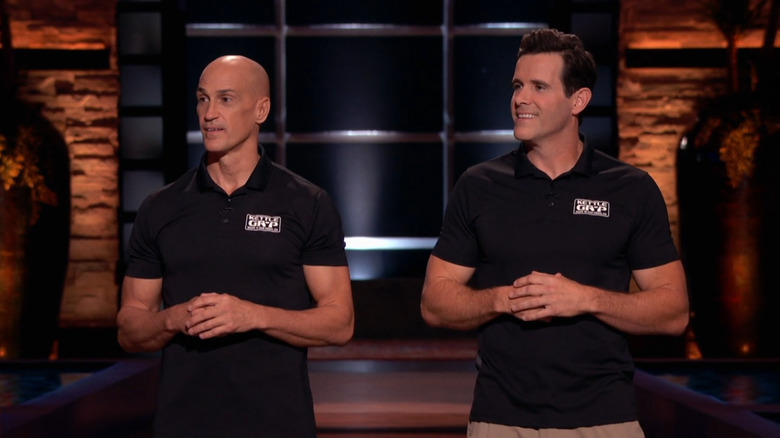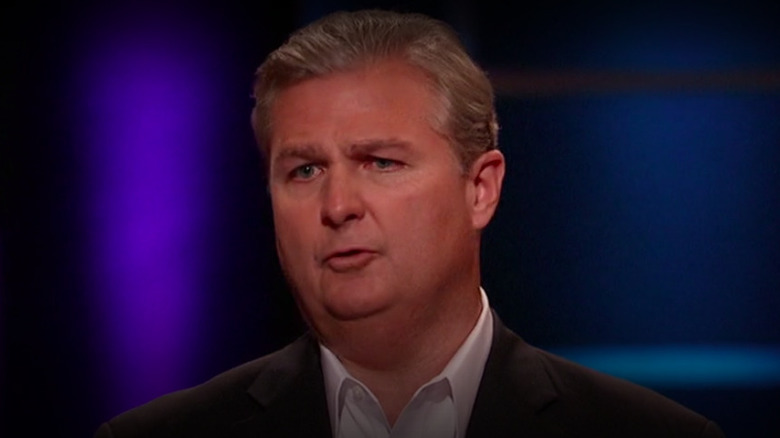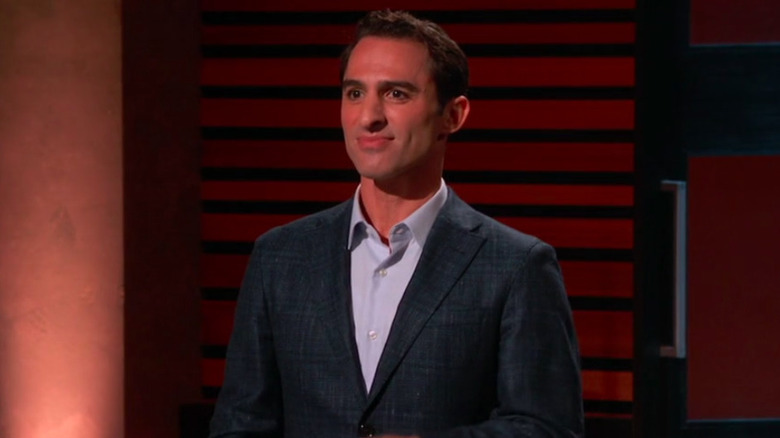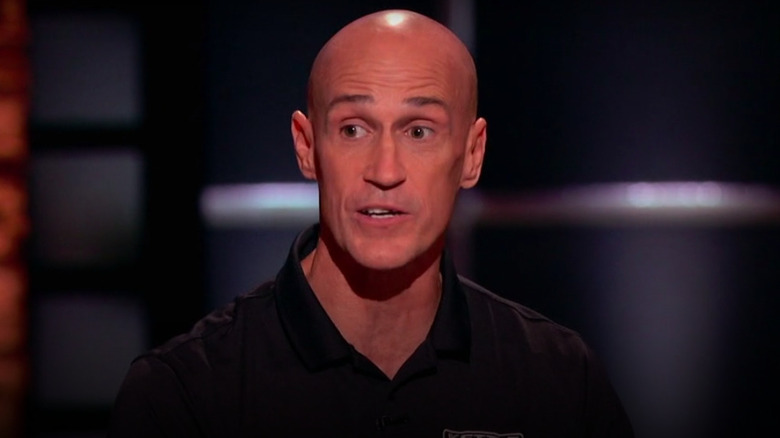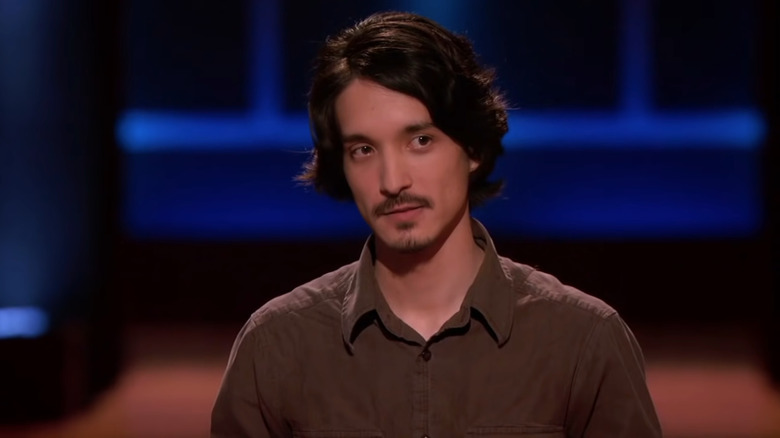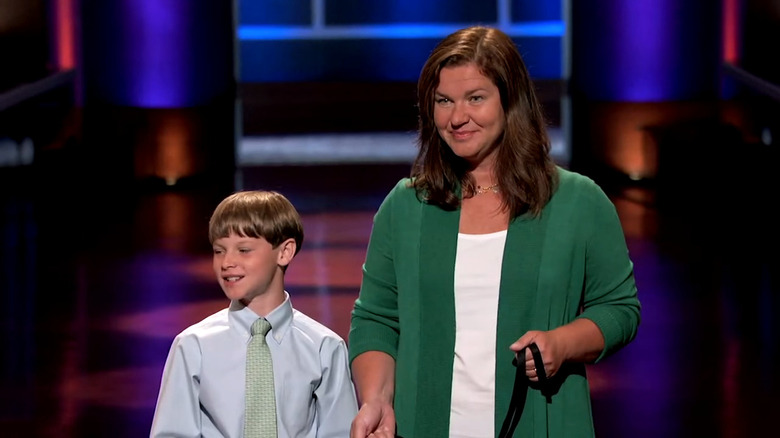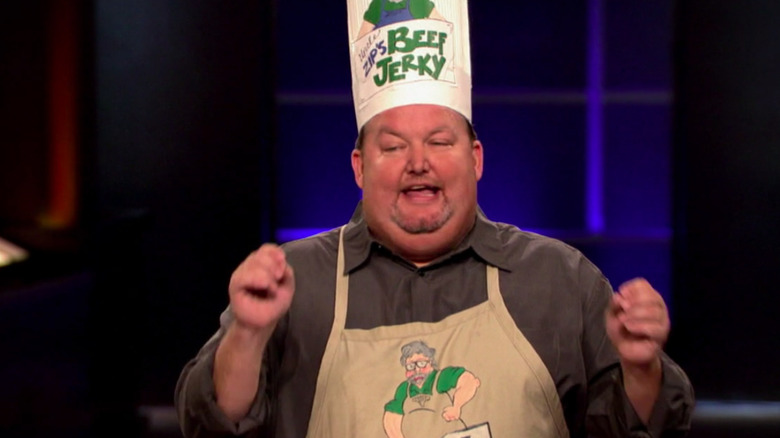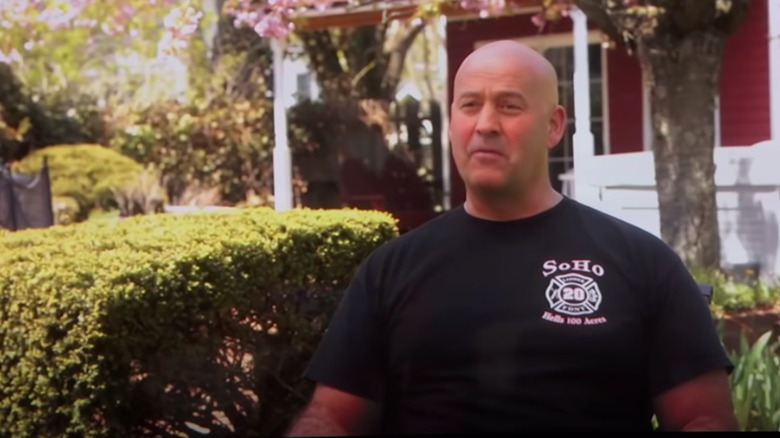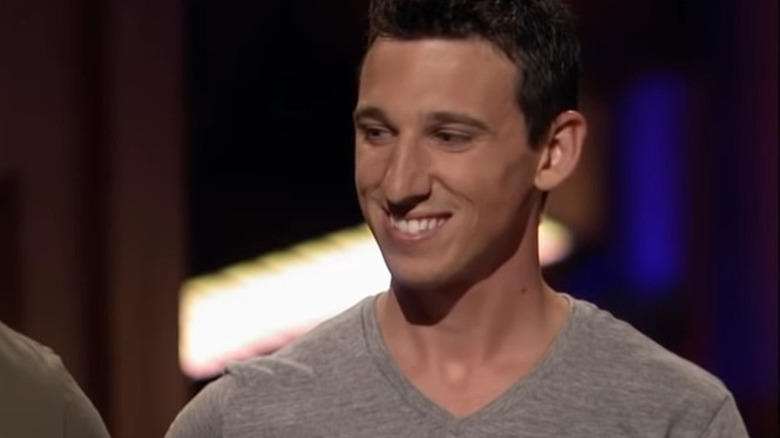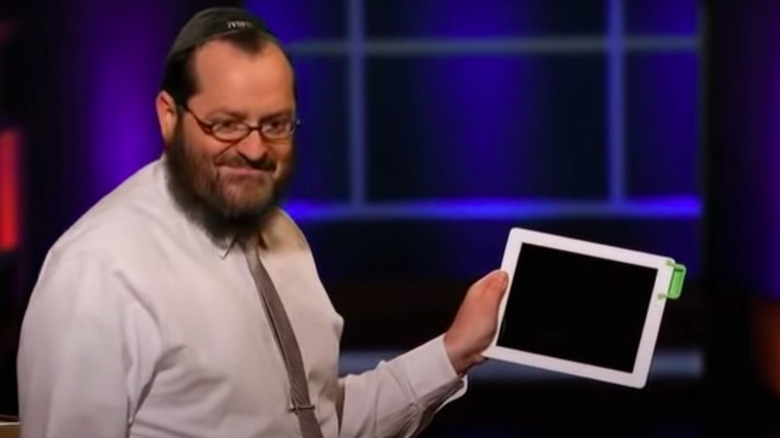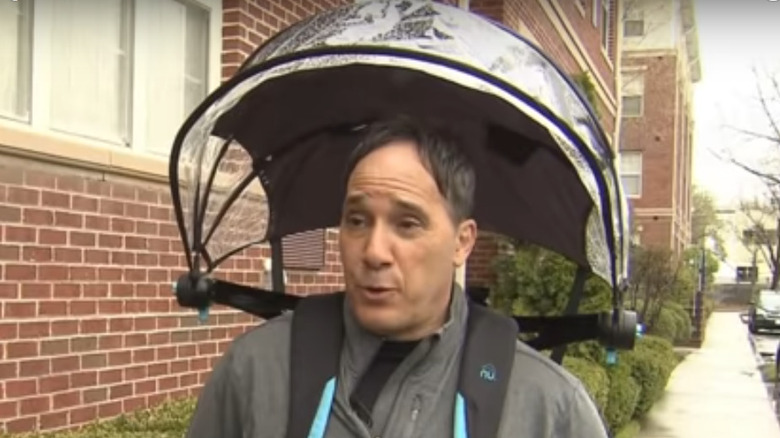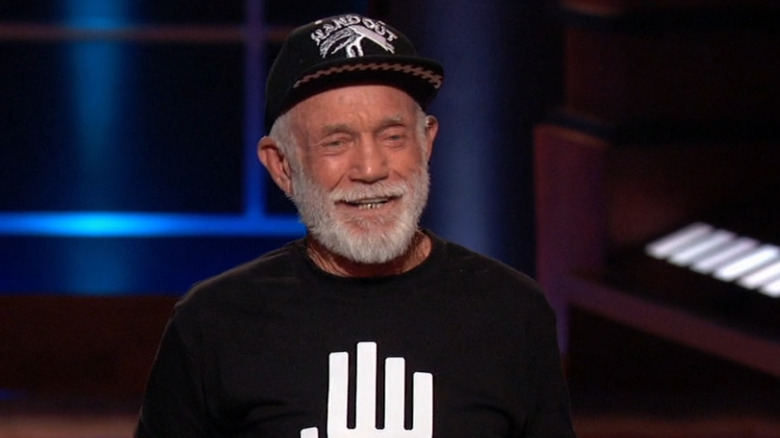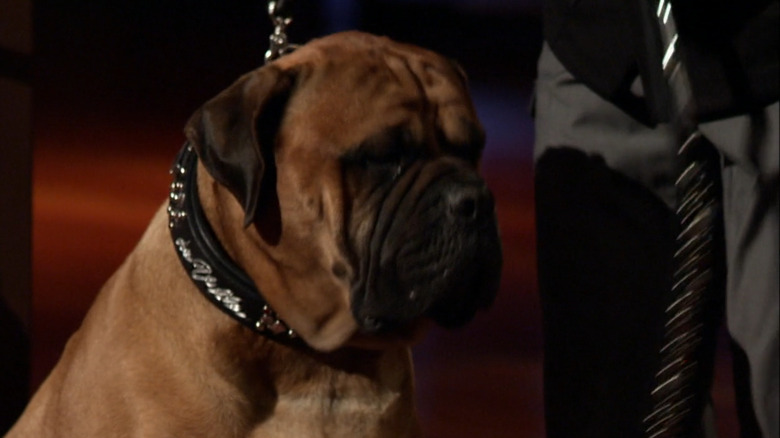Shark Tank Entrepreneurs You May Not Know Passed Away
Since its debut on ABC in 2009, the Emmy-winning reality series "Shark Tank" has given thousands of would-be entrepreneurs the chance to turn their dreams into reality by funding their inventions. A rotating list of well-known venture capitalists, including Mark Cuban, Lori Grenier, and Daymond John, have lent their wealth, business acumen, and connections to numerous creations, many of which have gone on to become top-selling items. Products like the Bombas apparel line, the Scrub Daddy sponge, and Groove Book, which sold to Shutterfly, all began their path to success as Shark Tank pitches.
"Shark Tank" is one of the longest-running reality series on television – its 15th season kicked off in 2023 — and many of the entrepreneurs from its early years have grown from fresh-faced hopefuls to business veterans. Some may have even retired, and a handful of "Shark Tank" contestants even died after their episodes aired (and as this list shows, two died before their appearances made it to broadcast). These are the "Shark Tank" contestants you may not know passed away.
Philip Reitnour (EmergenSee)
Philip Reitnour was with his children in Hawaii when an angry driver apparently targeted him. Unfamiliar with his surroundings and therefore unable to place a 911 call, he was eventually assisted by an EMS vehicle stopped in a nearby parking lot. The incident inspired Reitnour to create EmergenSee, an app that transmits streaming video and coordinates in life-threatening scenarios.
Reitnour funded EmergenSee with his own money before turning to "Shark Tank" in the show's sixth season. He failed to secure the Sharks' support, due in part to their skepticism over the $8.99 subscription price, but Reitnour later said the appearance was still a success because it boosted downloads. But the success proved short-lived; within three years of his appearance, Reitnour was bankrupt, in significant debt, and facing a lawsuit over a $6 million loan.
In 2017, police responded to a report of a body found in the Schuylkill River in Pennsylvania; a medical examiner's report confirmed that the deceased was the 58-year-old Reitnour and had a gunshot wound to the head. Police conducted an investigation to determine if the cause of death was suicide or homicide, though the findings do not appear to have been released.
Aaron Hirschhorn (Gallant)
Aaron Hirschhorn already found success in assisting pets with DogVacay, a dog-sitting service that netted over $100 million in sales before its acquisition by Rover in 2017. In 2018, he launched Gallant, a national stem cell bank for dogs (and later, cats, horses, and other animals) that he hoped would assist pets with health issues as they aged. Hirschhorn had both personal experience with and a vested interest in stem cell therapy: He used it to treat chronic back pain and wanted to help his own dog, which suffered from arthritis.
Hirschhorn brought Gallant to "Shark Tank" in Season 11, where he sought $500,000 for 2% equity in the company. He fielded three offers: two from Kevin O'Leary, including a 2% offer for options, and one from Lori Grenier and guest Shark Anne Wojcicki, CEO of the genetic ancestry company 23andMe. Hirschhorn eventually accepted a deal for 5% equity. Though the deal didn't come to pass, the publicity afforded by Hirschhorn's appearance gave Gallant the boost it needed to not only continue but also purchase a biotechnology company, Cook-Regentec.
But Hirschhorn did not live to see his company thrive. In May 2021, the U.S. Coast Guard informed the Florida Fish and Wildlife Conservation Commission that a 38-foot Chris-Craft motorboat was involved in an accident with a personal watercraft near Miami Beach. The 42-year-old entrepreneur, who piloted the watercraft, died at the scene.
Andy Thomas (Kettle Gryp)
Childhood friends and business partners Andy Thomas and Daniel Sheppard brought the Sharks a unique solution to the prohibitive cost of exercise equipment in Season 13, Episode 13. Their invention, the Kettle Gryp, allows the user to convert a dumbbell, which is held in one hand, into a kettlebell, which requires two hands to lift and is used for different forms of weight training. A quality iron kettlebell is large and heavy, which makes it difficult for travel and storage. It also costs upward of $50 to $100 or more, but the Kettle Gryp costs just $35 — a benefit to the consumer that brought Lori Grenier aboard for 15% of preferred stock in their company in exchange for a $300,000 investment.
Thomas's entrepreneurial career came after 20 years as a helicopter pilot for the United States Marine Corps. A husband and father, Thomas was diagnosed with cancer and died of the disease on December 16, 2021, shortly before the episode aired. Grenier paid tribute to his death with a January 29, 2022, post on X (formerly Twitter) in which she wrote, "Happy to be partners & to help fulfill ur legacy w/Kettle Gryp." The series also honored Thomas' memory with a tribute during the closing moments of his episode.
Ryan Frayne (Windcatcher)
The story of Ryan Frayne, who appeared on Season 7 of "Shark Tank," is fraught with remarkable triumphs and heartbreaking setbacks, but ultimately serves as a testimony to Frayne's determination in the face of seemingly insurmountable odds. His creation, the Windcatcher Quickstream Inflation device, allows users to fully blow up inflatable objects with little effort and in no time. The Sharks battled furiously to lay claim to the product, with Lori Greiner emerging victorious with $200,000 and $10 million in credit for 5% of the company.
Frayne's success was almost immediately tempered by a string of personal and professional setbacks. A company called Cascade Designs initiated a lawsuit against Frayne for similarities between the Windcatcher and one of their products. When the legal clash revealed that Frayne had not disclosed a business relationship with Cascade prior to his "Shark Tank" appearance, Grenier severed her ties to his company.
While dealing with the fallout from the Cascasde suit, the young inventor was also diagnosed with terminal pancreatic and liver cancer. He was able to weather the legal problems, which ended with a settlement and a license for Cascade Designs. But his health continued to decline, and Frayne turned over Windcatcher to his friend, Oren Hanson, and his wife, Geneve Nguyen, before his death on June 5, 2018. Unfortunately, it seems that Nguyen and Hanson were unable to keep Windcatcher afloat: The company shuttered in 2022.
Daniela Cos-Kelly (Ry's Ruffery)
The mother and son duo of Daniela Cos-Kelly and Ryan Kelly turned up on Season 4 of "Shark Tank," seeking $25,000 for their company, Ryan's Barkery. In exchange, the Kellys offered a 25% share of the business, which produces homemade gourmet treats for dogs. Barbara Corcoran took them up on the offer and counseled the company as it grew from a homegrown operation to a boutique organization. As segments from Seasons 5 and 6 and a Season 6 episode of "Beyond the Tank" showed, the Kellys' company — which changed its name to Ry's Ruffery – had products in many retail locations, including Target stores, and was netting $10,000 a month in revenue.
Unfortunately, the "Beyond the Tank" visit also revealed that Cos-Kelly had health issues: She suffered a stroke prior to their debut on "Shark Tank," and the physical and cognitive toll it took made keeping up with orders from major companies like PetSmart a challenge. Both Cos-Kelly and Ry's Ruffery are no longer with us: She died at the age of 48 on October 18, 2018, and the company appears to have shuttered in the wake of her death.
Ken Howell (Uncle Zip's Beef Jerky)
Ken Howell brought a legacy product to the sharks in Season 2, where he asked for $25,000 for 20% of his company, the North Carolina-based Uncle Zip's Beef Jerky. Howell's father founded the company but didn't live to see it become a local success thanks in part to his son's enthusiastic promotions. After taking over the company, Howell and his jerky were fixtures at local bowling alleys, bars, and other businesses. Though he won over the sharks with his determination, Howell wasn't able to secure an investment. But like many hopefuls, Uncle Zip's benefited greatly from Howell's appearance, which generated a wave of orders from viewers.
For Howell, the sudden success was upended by tragedy: The 45-year-old was diagnosed with stage 4 cancer and died soon after in May 2014. But Uncle Zip's soon rebounded thanks to Howell's childhood friend, Jeff Harris, who oversaw the company's website before becoming its owner. Today, he focuses the business on online sales and visitors to its retail location in Hope Mills while also expanding its line of jerky products, with Howell's original recipe remaining its flagship flavor.
Keith Young (Cup Board Pro)
Season 10 brought one of the most moving episodes of "Shark Tank" to viewers with the story of Keith Young and his kitchen product, the Cup Board Pro. A former New York City firefighter who assisted in the cleanup at Ground Zero after 9/11, Young's path to "Shark Tank" was marked by an almost cinematic mix of tragedy and joy. His signature creation was the Cup Board Pro — a bamboo cutting board with an attachable tray to hold scraps and grooves to collect juices from meat while keeping the board clean. Young developed the board in 2010 but put the business on hold when his wife, Beth, was diagnosed with breast cancer.
She died in 2012, but Young forged ahead, competing on and winning Food Network's "Chopped" twice. He then resumed work on the Cup Board Pro but was diagnosed with synovial sarcoma, a cancer that was related to the cleanup work after 9/11. Young died in March 2018, but his children — daughters Kaley and Keira and son Christian — were determined to make his dream a reality. They pitched the Cup Board Pro on "Shark Tank," which inspired a truly rare occurrence: All five Sharks partnered to back Cup Board Pro with $100,000 for 20% of the company and promised to donate their profits to a charity benefitting firefighters affected by 9/11. They also brokered a deal with Williams-Sonoma to sell the board in their retail locations, and Techie + Gamers reported that it's one of the company's best-selling products.
KJ Mastronardo (Nardo's Natural)
The Mastronardo brothers, a quartet of entrepreneurial siblings from Florida, brought their line of all-natural skin care products to "Shark Tank" in 2011 as part of Season 3. The Mastronardos launched their company, Nardo's Natural, in 2009, with the promise of locally sourced products — in this case, ones made from coconut oil — that were also certified organic and sustainable, and they sought $75,000 to keep it viable. Barbara Corcoran took the brothers up on their offer, but she did so for 50% of the business. The brothers accepted the deal.
Sadly, the youngest Mastronardo brother, Keith, did not live to see his brothers' company blossom into success. Keith, who was also known as KJ, contributed his background in business and accounting to Nardo's Natural; he died on March 19, 2013, while riding his motorcycle in Largo, Florida. He swerved to avoid an animal in the road and was thrown from his motorcycle, landing in the path of an oncoming car. Mastronardo was just 24 years old at the time of his death.
Rabbi Moshe Weiss (Soundbender)
When Rabbi Moshe Weiss recognized the need to improve sound quality on the iPad, it spurred him to create the Soundbender, a small, simple, but effective tool to correct the device's audio problems. Weiss found it difficult to get clear audio from the iPad's rear-facing speakers, but the Soundbender redirects and amplifies the sound toward the user with the help of a small plastic device and magnets.
After generating funds with online sales and a Kickstarter campaign, Weiss went to "Shark Tank" in Season 4 to raise more than $50,000 for business expansion purposes. Daymond John took him up on the offer (in exchange for 40% of the company). Their partnership helped bring the Soundbender to Amazon and other online retailers; Weiss remained active with the company but in later years focused his attention on his family and career as an educator at various Jewish schools throughout his native Minnesota. On August 28, 2016, Weiss died of heart complications at the age of 41; John posted a remembrance on Facebook, where he wrote, "He was a man that would bring energy and joy to any room he entered."
Alan Kaufman (Nubrella)
Entrepreneur Alan Kaufman came to "Shark Tank" in Season 1 with what he envisioned as a revolutionary new design for the umbrella. The Nubrella replaced the traditional extendable handle with a backpack frame that extended a retractable hood over the wearer in inclement weather. Kaufman, who sunk hundreds of thousands of dollars of his own money into his creation, hoped that the Sharks could make the Nubrella a hit and break the long-standing streak of failures that other wearable umbrellas have suffered.
After considerable deliberation, Kaufman accepted a joint offer from Daymond John and guest Shark Kevin Harrington that gave him $200,000 in exchange for a controlling stake (51%) in the company. However, the Nubrella story doesn't appear to have a happy ending: Kaufman filed two lawsuits against the producers of "Shark Tank," alleging that neither of the sharks' investments ever came to pass; additionally, he alleged that John's only assistance was to suggest a deal with The Sharper Image, which went bankrupt in 2009. The first suit netted a $20,000 settlement from Sony, but the second was dismissed in federal court. Kaufman later reorganized his company under a new name, Canope, and sold his product on Amazon and his own website. According to the Los Angeles Times, he died in November 2022.
Don Wildman (HandOut Gloves)
Donahue "Don" Wildman was already a success when he appeared on "Shark Tank" in Season 8. Wildman founded the Health & Tennis Corporation of America, a line of successful health clubs with over 200 locations that he sold to the Bally Corporation (the line was later rebranded Bally Total Fitness), and co-founded GolfBoard, which produced electric-powered golf scooters. He was hoping for a trifecta of wins with HandOut Gloves, a line of insulated, zippered gloves that allow the user to free their hands without actually removing the gloves. For his appearance, the 83-year-old Wildman – the oldest entrepreneur in "Shark Tank" history — was joined by HandOut creator Jake Sullivan.
Wildman and Sullivan sought $150,000 for 20% of the company, as well as a $150,000 loan. Barbara offered a $300,000 loan (at 6% interest) for 25% of the company. HandOut remains active and netted $1 million in sales in 2021. Wildman, who was once dubbed "The World's Healthiest 75-Year-Old Man" by Esquire, was an avid competitor in Ironman Triathlons and other competitions. He died on September 16, 2018, after declining to continue treatment for cancer.
DeVille (Villy Customs)
Aaron Hirschhorn and Ryan Kelly's dogs weren't the only beloved canines to inspire a Shark Tank entrepreneur. DeVille, a purebred bull mastiff, was the loyal companion of owner Fleetwood Hicks, who pursued his dream of launching Villy Custom, a line of fashion-forward bicycles made according to the customer's wishes. The dog not only served as the official mascot of the company but also lent his nickname, Villy, to the line, and accompanied Hicks when he faced off against the Sharks in Season 3. Hicks sought $500,000 for 33% of the company to fund its expansion; Mark Cuban and Barbara Corcoran teamed up to back Villy for 42% of the company.
Villy Customs became one of the great success stories in "Shark Tank" history; updates in Seasons 4 and 6 found that the company had expanded to an 11,000-foot space and enjoyed $4 million in sales a year. Unfortunately, Villy isn't around to enjoy his namesake success; he died shortly from cancer after the deal with Cuban and Corcoran was completed. Though saddened by the loss, Hicks has a new puppy that provides companionship and inspiration.
